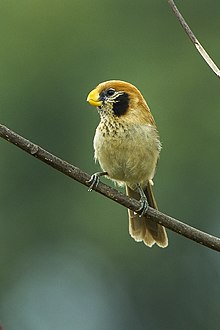| Parrotbill | |
|---|---|

| |
| Spot-breasted parrotbill (Paradoxornis guttaticollis) | |
| Scientific classification | |
| Domain: | Eukaryota |
| Kingdom: | Animalia |
| Phylum: | Chordata |
| Class: | Aves |
| Order: | Passeriformes |
| Superfamily: | Sylvioidea |
| Family: | Paradoxornithidae Horsfield & Moore, 1854 |
| Genera | |
The parrotbills are a family, Paradoxornithidae, of passerine birds that are primarily native to East, Southeast and South Asia, with a single species in western North America, though feral populations exist elsewhere. They are generally small birds that inhabit reedbeds, forests and similar habitats. The traditional parrotbills feed mainly on seeds, e.g. of grasses, to which their robust bill, as the name implies, is well-adapted. Members of the family are usually non-migratory.
The bearded reedling or "bearded tit", a Eurasian species formerly placed here, is more insectivorous by comparison, especially in summer. It also strikingly differs in morphology, such as its finer bill, and has again been moved to the monotypic family Panuridae. Conversely, a number of other mostly insectivorous species that traditionally were placed in Timaliidae (Old World babblers), for example the fulvettas and fire-tailed myzornis, along with the wrentit (a species with a conflicting taxonomic history), have been moved into Paradoxornithidae. DNA sequence data supports this.
Their general habitus and acrobatic habits resemble birds like the long-tailed tits. Together with these and others they were at some time placed in the titmouse family Paridae. Later studies found no justification to presume a close relationship between all these birds, and consequently the parrotbills and bearded reedling were removed from the tits and chickadees and placed into a distinct family. As names like Paradoxornis paradoxus – "puzzling, paradox bird" – suggest, their true relationships were very unclear, although by the latter 20th century they were generally seen as close to Timaliidae (Old World babblers) and Sylviidae (Old World warblers).